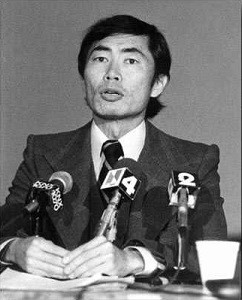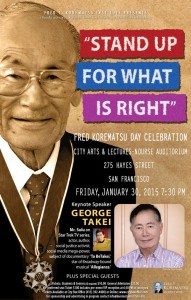Last week, our blog noted the nation’s celebration of Rev. Dr. Martin Luther King, Jr. Day. This week, our friends in California are recognizing the contributions made by the life and legacy of Fred Korematsu. Since 2010, California state legislation has designated January 30 as Fred Korematsu Day. To mark the 5th anniversary of this commemoration, the Fred Korematsu Institute in San Francisco is hosting a special evening featuring the inimitable George Takei.
Fred Korematsu’s actions in defiance of the incarceration of Americans of Japanese ancestry by the U.S. government during World War II cemented his role as a civil rights hero and a central figure in the effort to right the wrong of Japanese American internment. The Fred Korematsu Institute promotes programming that “remembers, instructs, and honors Americans who have suffered from prejudice, discrimination, and civil rights injustices,” making important connections between civil rights struggles of different communities, including those of Rev. Dr. Martin Luther King, Jr. and Cesar Chavez. Karen Korematsu, Fred Korematsu’s daughter and Executive Director of the Fred Korematsu Institute, reminds us that “people need to know that they can make a difference.”
 George Takei’s role in recognizing Fred Korematsu’s legacy is an appropriate one, given George’s own dedication to social justice. Parlaying his historic portrayal of Enterprise helmsman Hikaru Sulu on television’s “Star Trek” into a platform that allowed him to take advantage of social media and become dubbed “the king of Facebook,” George Takei has used his visibility to advocate for a number of different communities, including AAPI, LGBT people, and elders. As someone who fits all three categories, he more than most embodies the connections we make at the Diverse Elders Coalition.
George Takei’s role in recognizing Fred Korematsu’s legacy is an appropriate one, given George’s own dedication to social justice. Parlaying his historic portrayal of Enterprise helmsman Hikaru Sulu on television’s “Star Trek” into a platform that allowed him to take advantage of social media and become dubbed “the king of Facebook,” George Takei has used his visibility to advocate for a number of different communities, including AAPI, LGBT people, and elders. As someone who fits all three categories, he more than most embodies the connections we make at the Diverse Elders Coalition.
Fred Korematsu, as a civil rights icon for Asian Americans and Pacific Islanders, is a reminder that even communities that fall under the inaccurate perception of the “Model Minority Myth” have active histories of struggle and social justice. DEC member groups such as SEARAC and NAPCA know this firsthand, and their work on behalf of the AAPI community and elder population makes a critical contribution to DEC’s work on a range of issues. Other AAPI organizations, including the White House Initiative on Asian Americans and Pacific Islanders, are wrapping up a week-long social media campaign to raise awareness about the Affordable Care Act in AAPI communities, and we join that work and call for everyone to #SignUpB4TimesUp!


